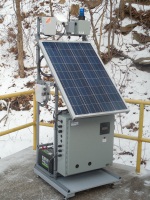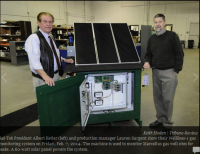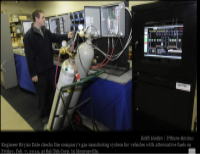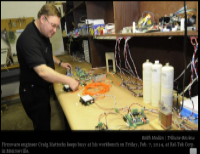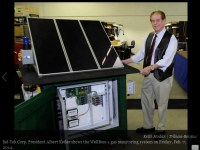News/Events
Well Gas Monitoring System (WellBoss) |
The following is an article from Tribune-Review about Rel-Tek Corporation By Timothy Puko on Monday, Feb. 10, 2014, 11:18 p.m and the photograhs were taken by Keith HodanHis devices are on the moon, underground and inside garages. The next frontier for Al Ketler is the great outdoors. Ketler, 79, owns Rel-Tek Corp., a Pittsburgh industrial technology company that makes systems to detect gas leaks. He started the company more than 30 years ago to help the mining industry stop underground explosions but now sees “big opportunities” above ground in the shale boom. Rel-Tek has designed a system to spot gas leaks at outdoor well sites — equipment that will help drillers address concerns about air pollution from greenhouse gases that may escape during hydraulic fracturing. “With the enormous quantity of wells out there, I think the market is pretty big,” Ketley said. “It's just an enormous burgeoning market.” Rel-Tek has long done work in garages for vehicles using natural gas fuel, buoyed by a $1 million deal with the transit agency in the nation's capital. And all that work has pushed the company to new distribution deals and a bigger headquarters. The company employs 10 people, including engineers, to design and assemble its systems. Ketler estimates annual sales of $3 million this year. “We're having people come to us now where we used to have to get on our hands and knees to beg for these projects,” Ketler said. “We're getting a lot of recognition now.” Ketler got his start with General Electric Co. in 1956 and designed generators that ended up on the moon as part of the Apollo program, he said. He left GE in 1970 and dabbled in other ventures before starting Rel-Tek in 1979. Although the company started in mining, about 60 percent of its work is unrelated to mining. It typically is from indoor places, such as tunnels and garages, where natural gas can build up. Its biggest revenue is from custom systems — sensors and special monitoring software — that can start at $10,000 for a small garage. The company added garage systems to its mine work in 1990, and Ketler is hoping the shale gas boom will help that grow. More trucks and buses — fleet vehicles often stored in big garages — are moving to use natural gas fuels. The Washington Metropolitan Area Transit Authority paid about $1 million in 2012 to equip the garage where it overhauls buses running on compressed natural gas. “If you want to work on a (natural) gas bus, you have to have the additional sensor for methane gas,” said Arthur Noyes, the authority's project manager for facilities. “For this system, it appears that it's a good solution. It looks like they've got a bright future in that.” In October, Ketler thought of the idea for his newest device, a monitoring system for the drilling sites themselves. The WellBoss-1 is about the size of a dog house with three solar panels on top. It holds Rel-Tek's traditional gas sensors, packaged to spot leaks of all types of gases, with the ability to send alarms to operators' cellphones or local fire houses. It cost about $9,500 for one system. Leak detection systems are not an untapped market for oil and gas drillers, said Andrew Woerner, an air quality and climate change consultant at Environmental Resources Management in Chester County. The most common are photoionization detectors that usually cost about $10,000 and infrared systems that can cost between $60,000 and $100,000, he said. Ketler said his is different, relying on thermal sensing. “People try all sorts of things with other technologies, and sometimes they make sense and sometimes they don't,” Woerner said. Rel-Tek's attempt to get into the market happens at a time of growing attention to the drilling industry's impact on air and climate change. The Pennsylvania Department of Environmental Protection in August approved regulations that require drillers to either start monitoring their entire well sites for gas leaks or seek detailed air pollution permits. There's an ongoing national effort spearheaded by the Environmental Defense Fund — with help from industry and universities — to figure out how much methane the gas industry leaks and whether increased gas production will quicken climate change. Ketler views those forces as big drivers for businesses and, he hopes, his sales. There's more of this environmental pressure on drillers and many other industries that are going to have to consider better technology, he said. “They didn't have to worry about that before; now they do,” Ketler said. “And we happen to have all the equipment that will do that.” The article can be found at the following link - Tribune-Review |
Lets Get in Touch!
Your inquiries will promptly be answered.
Call us
412-3736700




